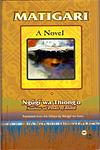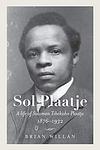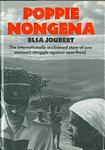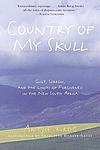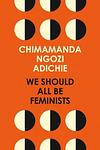Genres
The "Political" category of books encompasses works that explore the theory, practice, and history of government and politics. These books may cover topics such as political ideologies, political systems, political institutions, political movements, and political leaders. They may also examine the relationship between politics and other areas of society, such as economics, culture, and international relations. Political books can be both informative and thought-provoking, offering readers insights into the complexities of the political world and the challenges of governing in a democratic society.
Date Range
Reading Statistics
Click the button below to see how many of these books you've read!
Download
If you're interested in downloading this list as a CSV file for use in a spreadsheet application, you can easily do so by clicking the button below. Please note that to ensure a manageable file size and faster download, the CSV will include details for only the first 500 books.
Download-
1. Things Fall Apart by Chinua Achebe
This novel explores the life of Okonkwo, a respected warrior in the Umuofia clan of the Igbo tribe in Nigeria during the late 1800s. Okonkwo's world is disrupted by the arrival of European missionaries and the subsequent clash of cultures. The story examines the effects of colonialism on African societies, the clash between tradition and change, and the struggle between individual and society. Despite his efforts to resist the changes, Okonkwo's life, like his society, falls apart.
-
2. Waiting for the Barbarians by J M Coetzee
The novel is set in a small frontier town of an unnamed empire, where the magistrate lives a life of civil service and relative peace. His world is disrupted when the Empire declares a state of emergency due to rumors of barbarian uprising. The magistrate becomes a critic of the Empire's brutal and inhumane methods of dealing with the perceived threat, which leads to his arrest and torture. As he tries to understand his role in the vast political machinery, he also grapples with questions of power, justice, and humanity.
-
3. Woman at Point Zero by Nawal El Saadawi
"Woman at Point Zero" is a powerful novel about a woman named Firdaus who, after a life filled with hardships and abuse, finds herself on death row in an Egyptian prison. The narrative explores her life story, from her childhood of poverty and genital mutilation to her experiences with domestic violence, prostitution, and finally murder. Through her journey, the book offers a profound critique of patriarchal society and the systemic oppression of women.
-
4. Life & Times of Michael K by J M Coetzee
Set in South Africa during a civil war, the novel follows the journey of Michael K, a simple gardener with a cleft lip. When his mother falls ill, he attempts to take her back to her rural birthplace. After she dies en route, Michael continues the journey alone, struggling to survive in a war-torn landscape, while also being caught up in the bureaucratic red tape of the dystopian society. The story explores themes of freedom, survival, and the human spirit's resilience against adversity.
-
5. Burger's Daughter by Nadine Gordimer
"Burger's Daughter" is a novel centered around Rosa Burger, a white woman in South Africa during the apartheid era. The narrative delves into Rosa's life and struggle to find her identity, while also dealing with the legacy of her parents who were anti-apartheid activists. This story provides a deep look into the political and social climate of South Africa during a time of racial segregation and oppression.
-
6. The Wretched of the Earth by Frantz Fanon
This book is a psychological and political analysis of the dehumanizing effects of colonization upon the individual and the nation. It provides a clear, passionate condemnation of colonialism and its legacy, arguing that violence is a necessary component of decolonization. The author also discusses the challenges that newly independent nations face, including the struggle to establish a national culture and the threat of neocolonialism.
-
7. Petals of blood by Ngugi wa Thiong'o
This novel tells the story of four characters living in post-colonial Kenya, who are arrested for the murder of three prominent figures in their village. As the narrative unfolds, it explores their personal histories and how they are intertwined with the political, social, and economic transformations of the nation. The book is a critique of the corruption and inequality that emerged in Kenya after the end of colonial rule, and a call for a return to communal values and practices.
-
8. Dusklands by J M Coetzee
"Dusklands" is a novel divided into two distinct parts, each examining the theme of imperialism. The first part follows a psychologically unstable American government researcher during the Vietnam War, who is tasked with developing propaganda to justify the conflict. The second part is a historical narrative set in the 18th century, exploring the violent colonization of South Africa by the Dutch. The stories parallel each other, highlighting the destructive nature of imperialism and the psychological effects it has on individuals.
-
9. Ancestral Voices by Etienne van Heerden
"Ancestral Voices" is a haunting novel set in South Africa during the apartheid era. The story follows a young boy who grows up in a small rural town, navigating a complex web of familial relationships and secrets. As he matures, he becomes increasingly aware of the racial and social injustices that surround him. The book explores themes of identity, heritage, and the harsh realities of life under apartheid, all weaved together with a deep sense of the mystical and the supernatural.
-
10. Matigari by Ngugi wa Thiong'o
"Matigari" is a novel set in a post-colonial African nation, where the protagonist, who is a freedom fighter, emerges from the forest after the country's liberation, intent on finding justice and peace. However, he finds a society still deeply entrenched in corruption and oppression. The narrative uses allegory and symbolism to explore themes of justice, truth, and the fight against inequality. The protagonist's quest for justice becomes a threat to the government, leading to a manhunt for a man who is merely a myth.
-
11. Les Bouts De Bois De Dieu by Ousmane Sembène
"Les Bouts De Bois De Dieu" by Ousmane Sembene is a powerful and thought-provoking novel that depicts the struggles and resilience of a group of African railway workers in Senegal during the colonial era. As they face exploitation, discrimination, and harsh working conditions, the workers unite and organize a strike to demand better treatment and fair wages. Through vivid storytelling and compelling characters, the book explores themes of social injustice, solidarity, and the fight against oppression, highlighting the resilience and determination of the human spirit.
-
12. The Struggle For Mozambique by Eduardo Mondlane
"The Struggle For Mozambique" is a comprehensive account of the liberation struggle in Mozambique, written by Eduardo Mondlane. The book delves into the historical, political, and social context of Mozambique, tracing the country's path from Portuguese colonial rule to its fight for independence. It explores the challenges faced by the Mozambican people, the formation and evolution of the Mozambique Liberation Front (FRELIMO), and the tactics employed in their struggle against oppression. Through vivid storytelling and meticulous research, Mondlane sheds light on the resilience and determination of the Mozambican people in their quest for freedom and self-determination.
-
13. Native Life In South Africa by Sol Plaatje
"Native Life In South Africa" is a firsthand account of the experiences and struggles of the native African population in South Africa during the early 20th century. The author, Sol Plaatje, provides a powerful and insightful narrative that sheds light on the social, political, and economic injustices faced by the indigenous people under the oppressive system of colonialism. Through his vivid descriptions and personal anecdotes, Plaatje highlights the resilience and determination of the native population in their fight for equality and justice.
-
14. Ghana: The Autobiography Of Kwame Nkrumah by Kwame Nkrumah
This autobiography tells the story of Kwame Nkrumah, the first President of Ghana and a key figure in the country's struggle for independence from British colonial rule. Nkrumah recounts his early life, his education abroad, and his political journey, providing insights into his vision for a united and prosperous Africa. He reflects on the challenges faced during his presidency, including the economic and political obstacles that hindered Ghana's progress. Overall, this book offers a personal account of Nkrumah's life and the pivotal role he played in shaping Ghana's history.
-
15. Die Swerdjare Van Poppie Nongena by Elsa Joubert
"Die Swerdjare Van Poppie Nongena" is a powerful and poignant novel that tells the story of Poppie, a black South African woman, during the apartheid era. Set in the 1960s, Poppie faces immense challenges as she navigates the oppressive system that separates her from her family and forces her to endure constant discrimination and hardship. Through Poppie's experiences, the book explores themes of resilience, love, and the human spirit's ability to triumph in the face of adversity.
-
16. Unity And Struggle by Amilcar Cabral
"Unity And Struggle" explores the concept of national liberation and the fight against colonialism in Africa. The book delves into the importance of unity among oppressed peoples and the necessity of armed struggle to achieve true independence. Through a combination of historical analysis and personal experiences, the author emphasizes the need for a comprehensive understanding of the social, economic, and political factors that contribute to the liberation struggle. With a passionate call for solidarity and self-determination, "Unity And Struggle" serves as a powerful manifesto for those seeking freedom from oppression.
-
17. Xala by Ousmane Sembène
The book is a satirical novel set in post-independence Senegal, exploring themes of corruption, power, and tradition. It follows the story of a wealthy businessman who, after taking a third wife, finds himself afflicted with xala, a curse of impotence. His desperate attempts to cure his condition expose the hypocrisy and moral decay of the newly established elite, as he navigates the clash between modernity and traditional beliefs. The narrative serves as a critique of the neocolonialism that persists in African societies, highlighting the struggles between personal gain and societal progress.
-
18. Dumba Nengue, Run For Your Life by Lina Magaia
The book is a harrowing account of the Mozambican people's suffering during the civil war that followed the country's independence from Portugal. It compiles testimonies and personal stories that reveal the atrocities committed by the Renamo guerrillas, who were backed by foreign powers. Through the eyes of the survivors, the narrative exposes the brutalities of war, including the destruction of villages, the murder of innocent civilians, and the resilience of those who were forced to flee their homes. The work serves as both a poignant reminder of the cost of conflict and a tribute to the spirit of the Mozambican people who endured and survived amidst such terror.
-
19. A Geração Da Utopia by Pepetela
"A Geração Da Utopia" by Pepetela is a thought-provoking novel that explores the lives of a group of young Angolan intellectuals during the country's fight for independence. Set in the 1970s, the story follows the characters as they navigate through political turmoil, personal relationships, and their own dreams of building a utopian society. With a blend of historical context and fictional elements, the book delves into themes of idealism, disillusionment, and the complexities of revolution.
-
20. Cutting The Rose by Efua Doorkenoo
"Cutting The Rose" is a gripping and thought-provoking novel that delves into the complexities of identity, culture, and the power dynamics within a Ghanaian community. Set in the 1960s, the story follows the life of a young woman named Akosua, who must navigate the expectations placed upon her as a woman in a patriarchal society while also grappling with her own desires and ambitions. Through vivid storytelling and rich character development, the author explores themes of tradition, love, and the pursuit of self-discovery in a changing world.
-
21. Country Of My Skull by Antjie Krog
"Country Of My Skull" is a powerful and deeply personal account of the author's experiences as a journalist covering the Truth and Reconciliation Commission in post-apartheid South Africa. Through her vivid and introspective narrative, the author explores the complexities of forgiveness, justice, and the collective healing process of a nation grappling with its painful past. This thought-provoking book offers a unique perspective on the complexities of reconciliation and the enduring impact of trauma on individuals and societies.
-
22. We Should All Be Feminists by Chimamanda Ngozi Adichie
The book explores the importance of feminism in today's society and argues that gender equality is not just a women's issue, but a concern for everyone. Drawing from personal experiences and anecdotes, the author highlights the various ways in which gender inequality manifests itself and offers insightful perspectives on how we can work towards a more inclusive and equitable world for all.
-
23. The Return by Hisham Matar
"The Return" is a poignant memoir detailing a man's search for his father, who disappeared in Libya's political prison system. The narrative offers a deeply personal exploration of loss, memory, and homecoming as the protagonist returns to his native country after years of living in exile. The book also provides a profound insight into Libya's turbulent history, its oppressive regime, and the devastating impact of politics on individual lives.
-
24. No Longer At Ease by Chinua Achebe
The novel centers on a young Nigerian man, educated in England, who returns to his home country with high ideals and a desire to contribute to the development of a post-colonial, independent Nigeria. However, he finds himself trapped between the expectations of his traditional Igbo community and the corrupt practices entrenched in the government bureaucracy. As he struggles to navigate the complex moral landscape, his integrity is compromised, leading to his eventual downfall. The story is a poignant exploration of the challenges of modernity and the clash between traditional values and the temptations of a rapidly changing world.
-
25. Wizard of the Crow by Ngugi wa Thiong'o
The book is a satirical exploration of a fictional African dictatorship, focusing on the rule of a despotic leader and the corruption and power struggles within his regime. Amidst this political turmoil, a self-proclaimed wizard and a rebellious young woman become entangled in the machinations of the state, and their actions ultimately challenge the status quo. The novel combines elements of magic realism with political satire, providing a critique of post-colonial African politics while also exploring themes of love, power, and resistance.
Reading Statistics
Click the button below to see how many of these books you've read!
Download
If you're interested in downloading this list as a CSV file for use in a spreadsheet application, you can easily do so by clicking the button below. Please note that to ensure a manageable file size and faster download, the CSV will include details for only the first 500 books.
Download








